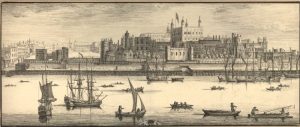
Photo source: Wikipedia http://bit.ly/2ws9LeN
The Tower of London dates back as far as 1066, although the White Tower was not built by William The Conqueror until 1078. The Tower was a resented symbol of oppression, inflicted by the ruling elite. The castle was used as a prison from 1100 until 1952, which was to hold the last prisoners, The Kray’s. Although a prison was not the primary purpose.
Early in the Towers history, it served as a grand palace as a royal residence. The Tower is made up of a complex design of two centric rings, a ring, within a ring of defensive walls and a moat. There have been several expansion phases, under Kings Richard The Lionheart, Henry III, and Edward I in the 12th and 13th centuries.
The Tower has played many roles from an armoury, a treasury, a menagerie, The Royal Mint, a public record office and the home of the Crown Jewels of England.
In the late 15th century, the castle was the prison of the Princes in the Tower.
Many figures were held within the great walls such as Elizabeth I before she became queen and Sir Walter. Only seven people were executed within the tower before the world wars of the 20th century. Executions were more commonly held on Tower Hill, with 112 occurring there over a 400 years period. In the first and second world wars, the Tower was again used as a prison and witnessed the executions of 12 men for espionage.
Anne Boleyn was beheaded in 1536 for treason against Henry VIII. Her ghost is said to haunt the chapel of St Peter and Vincula, where she is buried and it is said that she walks around the White Tower carrying her head under her arm.
In 1999, evidence that lions were held at the Tower became evident when cages were uncovered. One caged measured 6.5ft x 10ft. Very small for a lion that can grow to 8ft in length. In 2008, the skulls of two male Barbary lions, now extinct, from Northwest Africa were found in the moat area of the tower. Radiocarbon tests dated them from 1280-1385 and 1420-1480.